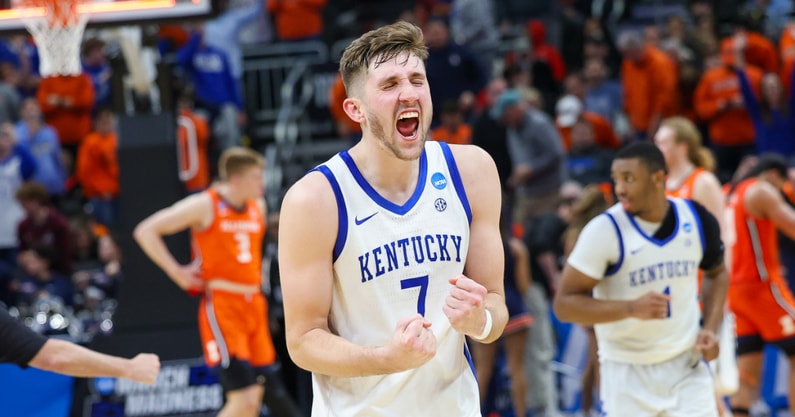Andrew Carr’s Decision to Decline USC’s $6.5 Million NIL Offer: A Strategic Move for Kentucky’s Star Forward
In a move that has captured the attention of the college basketball world, Andrew Carr, the five-star forward for the Kentucky Wildcats, recently declined a substantial $6.5 million NIL (Name, Image, and Likeness) offer from the University of Southern California (USC). This decision not only underscores Carr’s commitment to his current team but also highlights the evolving dynamics of college athletics, where financial incentives and personal values intersect.
Andrew Carr’s journey to collegiate basketball prominence has been marked by consistent performance and leadership. Standing at 6’10”, Carr’s versatility on the court has made him a valuable asset for the Kentucky Wildcats. Prior to his time at Kentucky, Carr played for Wake Forest, where he averaged 13.5 points, 6.8 rebounds, and 1.5 blocks per game, showcasing his all-around skills. His transfer to Kentucky was seen as a strategic move to elevate his game under the guidance of head coach Mark Pope.
The introduction of NIL rights has revolutionized college athletics, allowing athletes to profit from their personal brand. USC, known for its competitive athletic programs, extended a generous $6.5 million NIL offer to Carr, aiming to bolster their roster with his talents. This offer was part of a broader trend where universities seek to attract top-tier athletes through financial incentives.
Despite the lucrative offer from USC, Carr chose to remain with the Kentucky Wildcats. This decision reflects his loyalty to his current team and a commitment to the values instilled in him by his coaches and teammates. Carr’s choice emphasizes the importance of personal integrity and the desire to contribute to a program that aligns with his aspirations.
Carr’s decision has significant implications for the landscape of college basketball. It signals that while financial incentives are influential, they are not the sole determinants in an athlete’s decision-making process. Factors such as team culture, coaching philosophy, and personal growth opportunities continue to play pivotal roles. This shift may encourage other athletes to prioritize long-term development and alignment with program values over immediate financial gain.
As Carr continues his tenure with the Kentucky Wildcats, his leadership and performance will be closely watched. His ability to navigate the complexities of college athletics, balancing personal values with professional opportunities, sets a precedent for future generations of athletes. Carr’s journey underscores the evolving nature of college sports, where decisions are increasingly influenced by a combination of financial, personal, and professional factors.
Andrew Carr’s decision to decline USC’s $6.5 million NIL offer is a testament to his character and dedication to the Kentucky Wildcats. In an era where financial incentives often dominate headlines, Carr’s choice serves as a reminder that loyalty, values, and personal growth remain central to the collegiate athletic experience. His story is one of integrity, ambition, and a commitment to excellence, both on and off the court.



